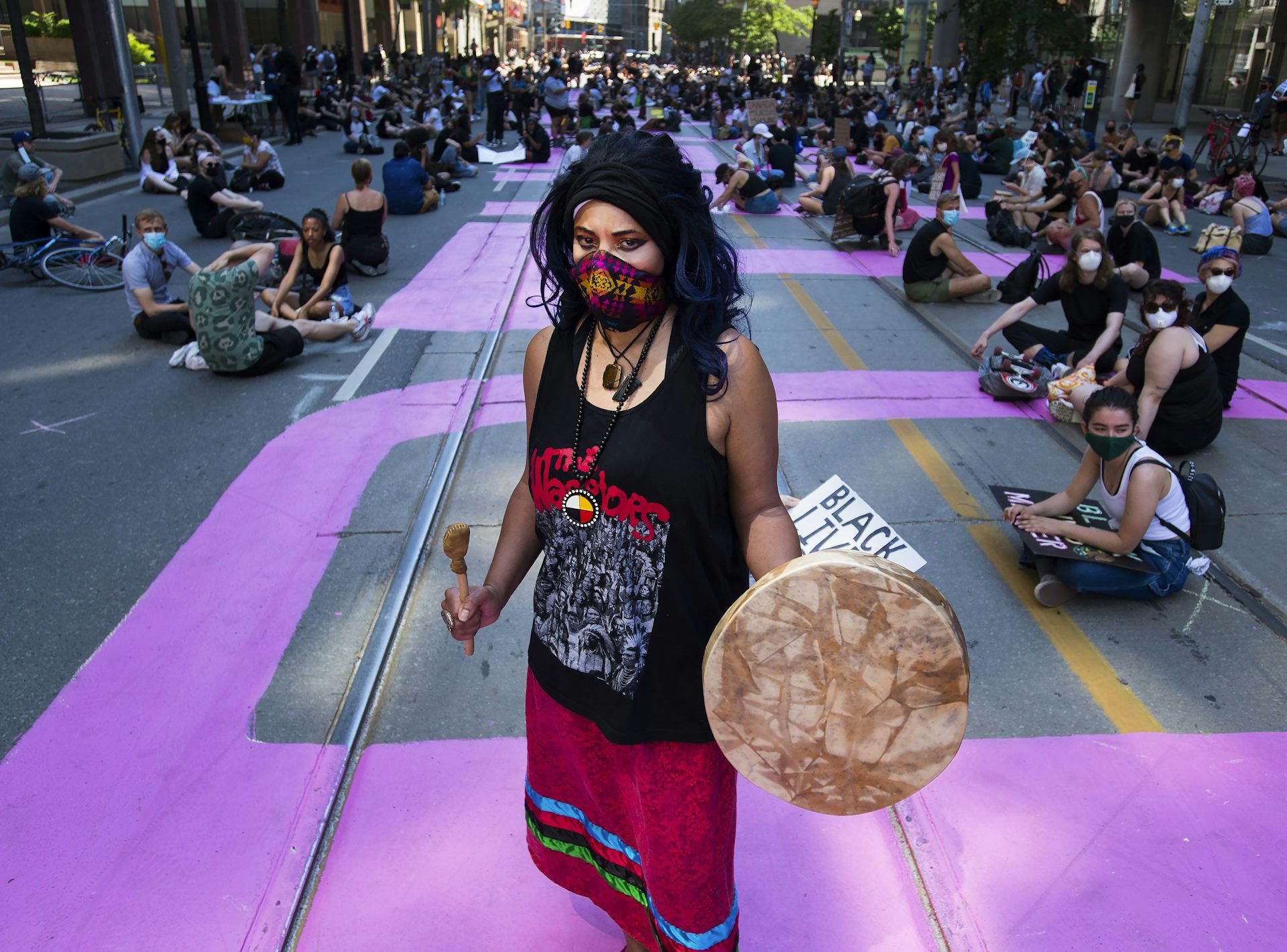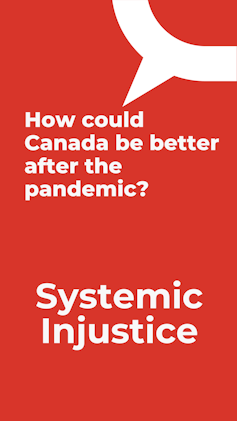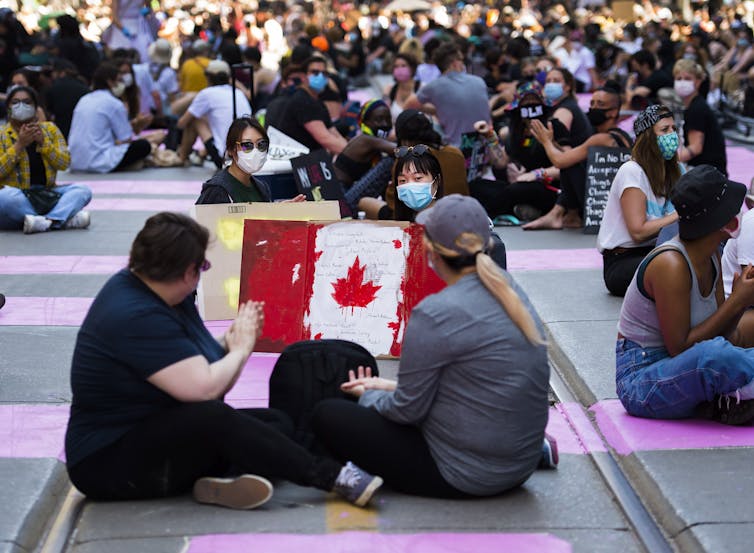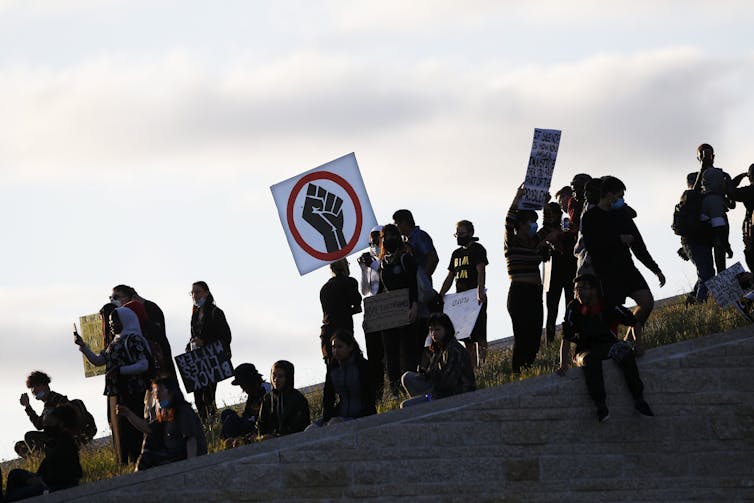
The Black Lives Matter demonstrations that took place across Canada during the pandemic showed that individual actions can make a difference. THE CANADIAN PRESS/Nathan Denette
July 1, 2020
This story is part of a series that proposes solutions to the many issues exposed during the coronavirus pandemic and what government and citizens can do to make Canada a better place.
I teach in gender studies, where I spend time with university students discussing critical issues that shape our society — power, violence, racism and colonialism. My students learn that histories are complicated and alive in the present.
Yet at a recent Black Lives Matter march in Winnipeg, I was struck by two simple messages: one protestor wore a T-shirt that read “Be kind” and another walked by with a sign saying: “Get your knee off our necks.”
The message to “be kind” seemed to gesture to another world, a world in which one white knee could not possibly have the power to end one Black life. The second message drove home the fact that we live nowhere close to such a world.

This story is part of a series that proposes solutions to the many issues exposed during the coronavirus pandemic and what government and citizens can do to make Canada a better place.
I teach in gender studies, where I spend time with university students discussing critical issues that shape our society — power, violence, racism and colonialism. My students learn that histories are complicated and alive in the present.
Yet at a recent Black Lives Matter march in Winnipeg, I was struck by two simple messages: one protestor wore a T-shirt that read “Be kind” and another walked by with a sign saying: “Get your knee off our necks.”
The message to “be kind” seemed to gesture to another world, a world in which one white knee could not possibly have the power to end one Black life. The second message drove home the fact that we live nowhere close to such a world.

Click here for more articles from this ongoing series
Instead, we live in a world where “normal” means systemic injustice that has become only more intense and apparent during COVID–19.
We live in a world where white women like me don’t have to teach our white kids to keep our hands on the wheel if stopped by police. We don’t have to tell them never to talk back, always to agree, always to do exactly as they are told. We can say to them that they need to treat others with kindness and respect — and that they deserve and can expect the same in return.
Make use of power
Canada could be better in a post-COVID-19 world if all of us recognize and make use of the power of our everyday actions toward social justice. We cannot be comfortable in a world where some of us are afforded kindness and respect, taught to expect it, and others are not.

Instead, we live in a world where “normal” means systemic injustice that has become only more intense and apparent during COVID–19.
We live in a world where white women like me don’t have to teach our white kids to keep our hands on the wheel if stopped by police. We don’t have to tell them never to talk back, always to agree, always to do exactly as they are told. We can say to them that they need to treat others with kindness and respect — and that they deserve and can expect the same in return.
Make use of power
Canada could be better in a post-COVID-19 world if all of us recognize and make use of the power of our everyday actions toward social justice. We cannot be comfortable in a world where some of us are afforded kindness and respect, taught to expect it, and others are not.

Canadians have taken to the streets during the pandemic to challenge systemic racism that exists in our society. CANADIAN PRESS/Nathan Denette
During the pandemic, we have seen our ability to act in alignment with public health measures. As a result, we have all contributed to the success of reducing the spread and severity of this virus. But unlike COVID-19, injustice does not spread by accident. Injustice is about power: who has access to it and who does not.
The norm of present-day inequities stems from a history of colonialism in which white men with access to power built systems that benefited them at the expense of others.
Whether we look historically at the Canadian government starvation policy that helped to clear the Prairies of Indigenous people to make room for white settlers, the 200 years of slavery in Canada or the legal enforcement of women’s subordinate status, we find a common theme: only propertied white men counted as fully human, and therefore they were the only ones who received rights, recognition and respect.
Altering the status quo
Although such an idea is counter to the equality touted in the Canadian Charter of Rights and Freedoms, we witness its continued effects in multiple forms — for example, in the climate of anti-Black racism and ongoing violence against Indigenous women, girls and two-spirit people. Yet we also see a groundswell of support for Black Lives Matter in the wake of the murder of George Floyd. In large enough numbers, people with access to less power can alter the status quo.
It is crucial to name a problem — in this case, systemic injustice — in order to make it visible. The naming is important because it allows us to understand that the violence follows a pattern. But naming alone does not make change happen. Action does.
Calls for “systemic change” seem big and complicated, like the histories that brought us to this moment. But the systems that need changing do not exist in some separate realm. They are made up of people who make decisions every day, decisions about how to act and about who matters.
Similarly, people’s experiences of unjust structures are not structural. They are personal, the result of the actions of others — actions rooted in the belief that some people matter more than others. Actions could equally be rooted in another belief: the belief that everyone is equally human. No one is an object and so no one should be objectified.
Everyone is equally human
We do need systemic change. We cannot accept a status quo of racialized and gendered violence. We are not equally implicated in the structures that operate unjustly, but we all do interact daily with other people (even if those interactions take place at a physical distance these days). Those interactions give us the opportunity to act in line with the belief that everyone is equally human, and equally entitled to the rights, recognition and respect historically granted only to the few.

During the pandemic, we have seen our ability to act in alignment with public health measures. As a result, we have all contributed to the success of reducing the spread and severity of this virus. But unlike COVID-19, injustice does not spread by accident. Injustice is about power: who has access to it and who does not.
The norm of present-day inequities stems from a history of colonialism in which white men with access to power built systems that benefited them at the expense of others.
Whether we look historically at the Canadian government starvation policy that helped to clear the Prairies of Indigenous people to make room for white settlers, the 200 years of slavery in Canada or the legal enforcement of women’s subordinate status, we find a common theme: only propertied white men counted as fully human, and therefore they were the only ones who received rights, recognition and respect.
Altering the status quo
Although such an idea is counter to the equality touted in the Canadian Charter of Rights and Freedoms, we witness its continued effects in multiple forms — for example, in the climate of anti-Black racism and ongoing violence against Indigenous women, girls and two-spirit people. Yet we also see a groundswell of support for Black Lives Matter in the wake of the murder of George Floyd. In large enough numbers, people with access to less power can alter the status quo.
It is crucial to name a problem — in this case, systemic injustice — in order to make it visible. The naming is important because it allows us to understand that the violence follows a pattern. But naming alone does not make change happen. Action does.
Calls for “systemic change” seem big and complicated, like the histories that brought us to this moment. But the systems that need changing do not exist in some separate realm. They are made up of people who make decisions every day, decisions about how to act and about who matters.
Similarly, people’s experiences of unjust structures are not structural. They are personal, the result of the actions of others — actions rooted in the belief that some people matter more than others. Actions could equally be rooted in another belief: the belief that everyone is equally human. No one is an object and so no one should be objectified.
Everyone is equally human
We do need systemic change. We cannot accept a status quo of racialized and gendered violence. We are not equally implicated in the structures that operate unjustly, but we all do interact daily with other people (even if those interactions take place at a physical distance these days). Those interactions give us the opportunity to act in line with the belief that everyone is equally human, and equally entitled to the rights, recognition and respect historically granted only to the few.

People in Winnipeg gather in solidarity with the George Floyd
protests held across the United States in Winnipeg.
THE CANADIAN PRESS/John Woods
It has taken centuries to build up unjust structures. They will not disappear quickly. Yet it is also true that unjust structures require unjust beliefs to hold them up. Taking apart the structures goes hand in hand with challenging the beliefs.
Millions of protesters have stood up against the institutionalized belief that Black lives do not matter. Black Lives Matter. It is incumbent upon all of us, particularly those with access to power, to act in alignment with a status quo of justice and respect.
“Be kind.” It’s true that it is a simple imperative. It might be a good place to start.
Be kind. Learn our collective history. Act in kind and respectful ways, every day. End the violence.
Author

It has taken centuries to build up unjust structures. They will not disappear quickly. Yet it is also true that unjust structures require unjust beliefs to hold them up. Taking apart the structures goes hand in hand with challenging the beliefs.
Millions of protesters have stood up against the institutionalized belief that Black lives do not matter. Black Lives Matter. It is incumbent upon all of us, particularly those with access to power, to act in alignment with a status quo of justice and respect.
“Be kind.” It’s true that it is a simple imperative. It might be a good place to start.
Be kind. Learn our collective history. Act in kind and respectful ways, every day. End the violence.
Author
Jocelyn Thorpe
Associate Professsor, Women's and Gender Studies, History, University of Manitoba
Disclosure statement
Jocelyn Thorpe has received funding from SSHRC.

Associate Professsor, Women's and Gender Studies, History, University of Manitoba
Disclosure statement
Jocelyn Thorpe has received funding from SSHRC.

No comments:
Post a Comment